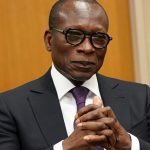Politics
Benin Politics
This page explores Benin’s political structure incorporating real-time RSS feed news and videos. By harnessing the power of RSS feeds, visitors can stay informed about the latest developments in Benin’s politics as they happen. The dynamic nature of these feeds ensures that users receive up-to-the-minute updates on political events, policy changes, and significant milestones, enabling them to stay abreast of the ever-evolving political scene.

Patrice Talon
8th President of Benin
Incumbent
Assumed office
Image credit
Benin operates under a presidential republic political structure. The country is a presidential democracy, with the President of Benin serving as both the head of state and government. The President is elected through a popular vote for a five-year term and can serve a maximum of two terms. The President holds significant executive powers and is responsible for leading the government, implementing policies, and representing Benin domestically and internationally.
The parliament of Benin is a unicameral legislature known as the National Assembly. It consists of members who are elected through a majority system in single-member constituencies. The National Assembly is responsible for making laws, approving the national budget, and exercising legislative oversight over the executive branch. The President appoints the Prime Minister from the majority party in the National Assembly. Benin also has an independent judiciary that operates separately from the executive and legislative branches. The judiciary is responsible for interpreting and applying the law, ensuring justice, and protecting the rights of individuals. The Constitutional Court of Benin is the highest court in the country and plays a crucial role in upholding the constitutionality of laws and resolving constitutional disputes.
The political structure in Benin is designed to uphold democratic principles, including the separation of powers, regular elections, and protection of individual rights and freedoms. While Benin has seen progress in democratic governance, challenges such as corruption and limited political competition have been raised as areas that require attention and reform. Efforts to strengthen democratic institutions and promote good governance continue in the country.
Unless other sources are cited, original content is provided by ChatGPT. ChatGPT may produce inaccurate information about people, places, or facts. #Benin #BeninPolitics #BeninNews #BeninNewsToday #BeninRSSFeed #BlahFace



